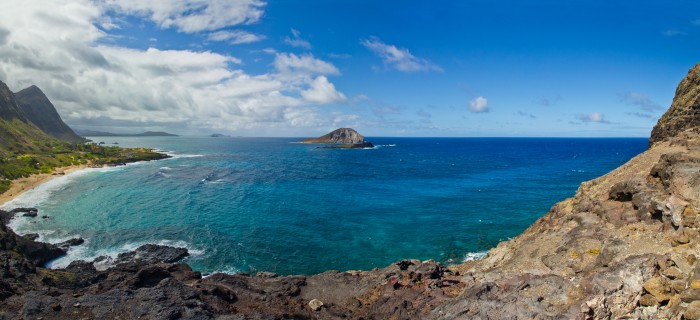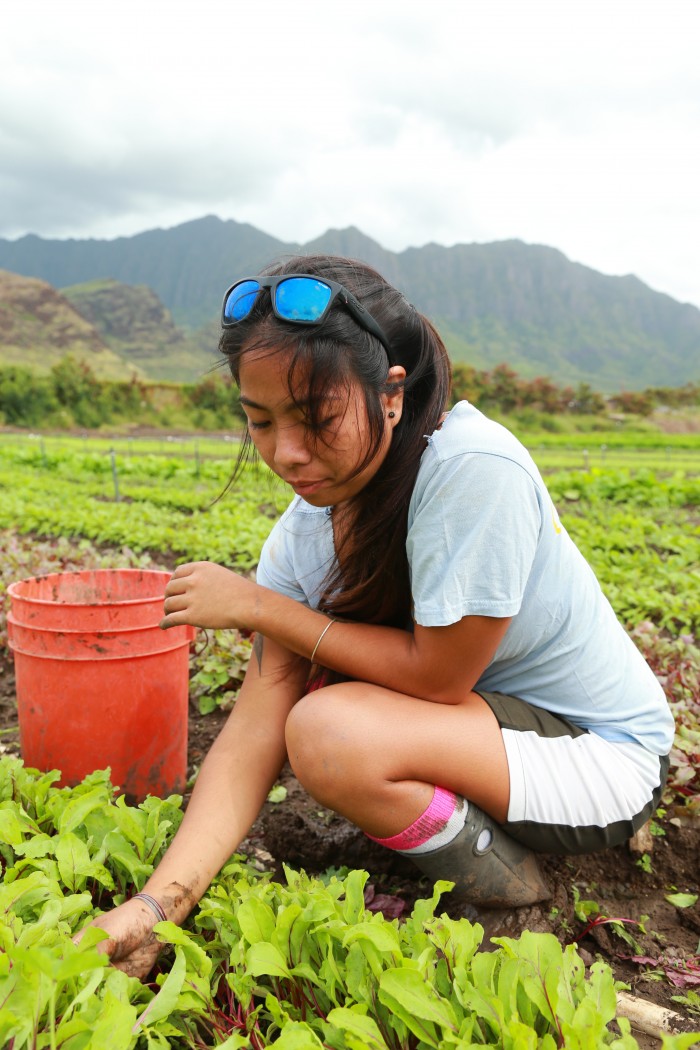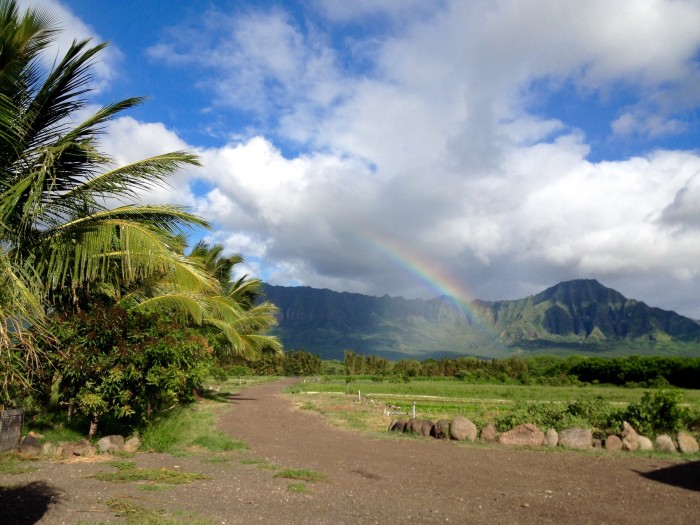REGISTER NOW!
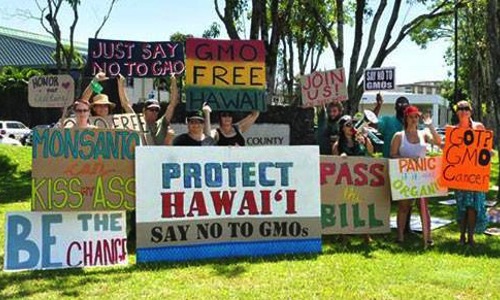 Lauded as the “paradise of the Pacific,” Hawai‘i’s beauty enchants foreigners and locals alike. But beyond its beaches, Hawaii also has a vibrant food movement—from pro-surfers advocating GMO labeling to a recent victory in Maui, which passed a moratorium on genetically modified crops. Aloha ‘Aina—meaning “love of land” in Hawaiian—grounds this food movement. This ancient Hawaiian concept has inspired social movements for land, sovereignty and peace, and emphasized ecological and cultural responsibility. Drawing on this powerful concept, Food First’s inaugural Hawai’i Food Sovereignty Tour will focus on the stunning tropical island of O’ahu and explore its movement for food sovereignty in the face of a globalized, corporate food system. We’ll tour farms across the island and meet with diverse actors to see how the movement is nurturing the next generation of farmers, community leaders, and scholars. Along the way, we’ll see how a history of occupation, militarization, and cultural appropriation have shaped Hawai’i’s food system, while highlighting the Hawaiian people’s struggle for self-determination and food sovereignty.
Lauded as the “paradise of the Pacific,” Hawai‘i’s beauty enchants foreigners and locals alike. But beyond its beaches, Hawaii also has a vibrant food movement—from pro-surfers advocating GMO labeling to a recent victory in Maui, which passed a moratorium on genetically modified crops. Aloha ‘Aina—meaning “love of land” in Hawaiian—grounds this food movement. This ancient Hawaiian concept has inspired social movements for land, sovereignty and peace, and emphasized ecological and cultural responsibility. Drawing on this powerful concept, Food First’s inaugural Hawai’i Food Sovereignty Tour will focus on the stunning tropical island of O’ahu and explore its movement for food sovereignty in the face of a globalized, corporate food system. We’ll tour farms across the island and meet with diverse actors to see how the movement is nurturing the next generation of farmers, community leaders, and scholars. Along the way, we’ll see how a history of occupation, militarization, and cultural appropriation have shaped Hawai’i’s food system, while highlighting the Hawaiian people’s struggle for self-determination and food sovereignty.
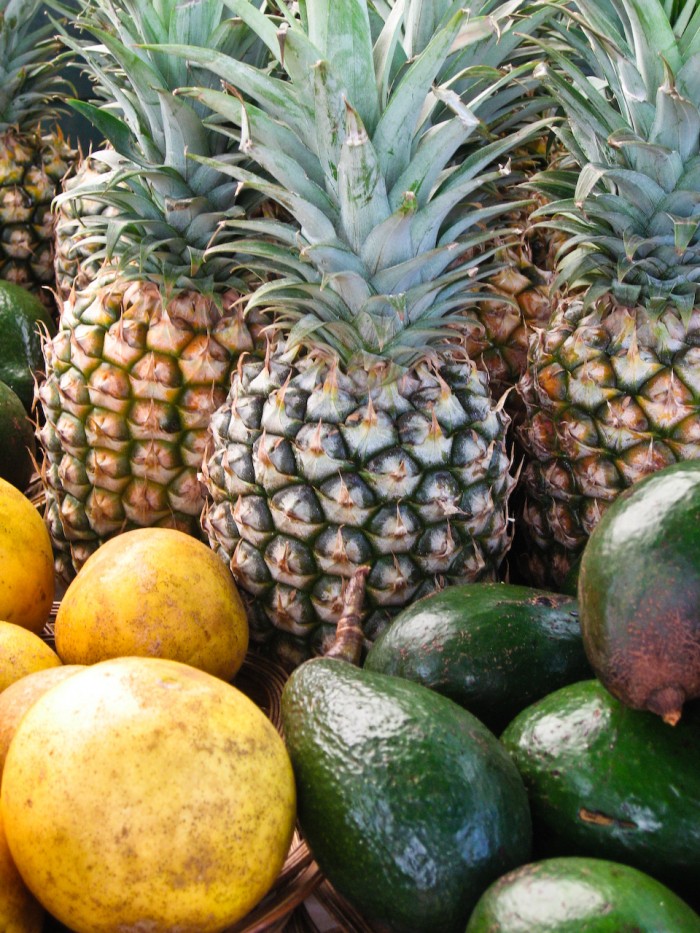 With a $14 billion tourism industry, Hawai’i’s white sand beaches, lush landscapes, and cultural charm are no secret. The 1,523-mile long archipelago also boasts remarkable biodiversity—from rich coastlines to volcanic mountaintops, with thousands of species of native plants and animals. Equally diverse is Hawai’i’s cultural heritage, reflected in a complex food culture from poke to poi, plate lunches to Slow Food. Its agriculture is known and enjoyed the world over, as Hawai’i’s bounty and year-round growing season provide a myriad of tropical exports including pineapples, sugar, coffee, flowers, and macadamia nuts.
With a $14 billion tourism industry, Hawai’i’s white sand beaches, lush landscapes, and cultural charm are no secret. The 1,523-mile long archipelago also boasts remarkable biodiversity—from rich coastlines to volcanic mountaintops, with thousands of species of native plants and animals. Equally diverse is Hawai’i’s cultural heritage, reflected in a complex food culture from poke to poi, plate lunches to Slow Food. Its agriculture is known and enjoyed the world over, as Hawai’i’s bounty and year-round growing season provide a myriad of tropical exports including pineapples, sugar, coffee, flowers, and macadamia nuts.
Paradise, however, is not without its contradictions. After many years of military occupation—which intensified after the Japanese bombing of Pearl Harbor in 1941—the republic became a US state in 1959, solidifying American geopolitical interests in the Pacific. Much of Hawaii’s traditional farming systems were destroyed during this period due to a combination of massive military expansion onto arable land coupled with ever-expanding sugar and pineapple plantations. Immigrants from Japan to Portugal supplied the labor for these plantations – diasporas that today are reflected in Hawaii’s multicultural society and complex food culture.
Explore O’ahu’s beautiful landscapes & vibrant culinary traditions while meeting with the actors cultivating food justice in paradise.
In recent years, Hawai’i has also turned into ground zero for chemical companies, with the top six agri-giants including Monsanto and Dow testing insecticides, fertilizers and genetically modified organisms (GMOs) on thousands of acres of arable land. Alarmed by massive open-air chemical trials, communities are demanding transparency and safety measures. Thus far, they have mostly been met with a blatant disregard for the long-term health of the people and the land.
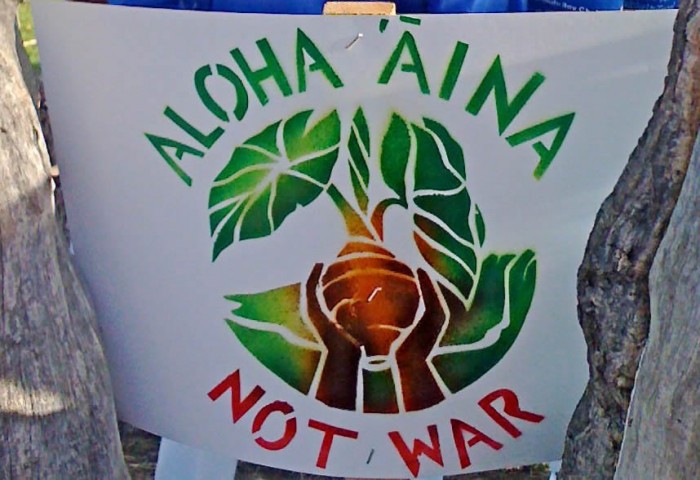 US occupation, industrial agriculture, conventional tourism, and militarization have exacerbated conflicts over resources, land and energy and undermined local culture, health and food systems. In the face of these challenges, however, there is incredible resilience and innovation. Hawaiians are increasingly turning to local food and native food traditions, ecologically-based farming systems, and a re-valuing of traditional ways grounded in Aloha ‘Aina. Made up of elders and youth alike, this inspiring island food movement defends local identity and interests in the face of powerful global forces. With Food First and our partners as your guide, explore O’ahu’s beautiful landscapes and vibrant culinary traditions while meeting with the actors cultivating food justice in paradise.
US occupation, industrial agriculture, conventional tourism, and militarization have exacerbated conflicts over resources, land and energy and undermined local culture, health and food systems. In the face of these challenges, however, there is incredible resilience and innovation. Hawaiians are increasingly turning to local food and native food traditions, ecologically-based farming systems, and a re-valuing of traditional ways grounded in Aloha ‘Aina. Made up of elders and youth alike, this inspiring island food movement defends local identity and interests in the face of powerful global forces. With Food First and our partners as your guide, explore O’ahu’s beautiful landscapes and vibrant culinary traditions while meeting with the actors cultivating food justice in paradise.
Tour highlights may include:
- Visit MA’O Organic Farm, a beautiful nonprofit farm working for youth empowerment, social justice, and economic sustainability.
- Visit some of the most significant cultural sites of O’ahu, where we’ll be joined by Hawaiian elders to learn about Hawaiian cosmology.
- Explore the impact of militarization and visit historic landmarks such as Pearl Harbor, where locals are working to reclaim the land and history through wetland farming.
- See the many ways Hawaiians are taking back control of their food systems including farmers’ markets, local food councils, and land-based foundations for community health.
- Meet with the Hawaiian independence movement for a presentation on the US occupation & militarization in Hawai’i.
- Stay at the beautiful Kahumana Farm where we’ll tour the organic, biodynamic farm and learn about their work to co-create a healthy, inclusive and productive farm-based community and talk about the farm’s agroecological practices.
- Meet with local kava farmers and discuss the different traditional medicinal, religious, political, social and cultural uses of the kava plant. Optional tasting!
- Meet with representatives from O’ahu’s anti-GMO Movement to learn about the vibrant movement growing across Hawaii and the specific actions happening in O’ahu.
- Explore the contributions of O’ahu’s diverse immigrant backgrounds on Hawai’i’s food culture.
Download the Hawaii Info Sheet and/or contact foodsovtours@foodfirst.org for a sample tour itinerary!
TOUR PRICE: TBA*
*We are committed to fairly compensating everyone who contributes their labor, time, and passion to enriching our delegations and making them run smoothly. A limited number of partial scholarships are available for eligible applicants on a first-come, first-served basis.
- All in-country transportation during the tour including airport transfer to and from Honolulu International Airport in Oahu (HNL) on the first and last days of the tour
- Three-star accommodations for 8 nights (double occupancy). A limited number of single accommodations are available for an additional fee of $300. Please check availability by contacting foodsovtours@foodfirst.org
- 2 – 3 meals per day
- Experienced trip leaders, local guides and drivers
- Honoraria for speakers and donations to host communities
- Preparatory reading materials (“Tour Reader”) and Orientation Packet
- All scheduled program activities including presentations, workshops, and entrance fees
- Food First membership
Price does NOT include: Airfare to/from Honolulu, most beverages, gratuities, travel insurance, and personal expenses.
Special Notes for Hawaii: August is a beautiful time to be in Oahu. Please note however that summertime usually brings higher temperatures and humidity. Trade winds will have a nice cooling effect, and we plan to have some beach-time and earlier morning farm visits to mitigate the heat, but please come prepared for tropical weather.
CLICK HERE TO REGISTER
Your Tour Coordinators:
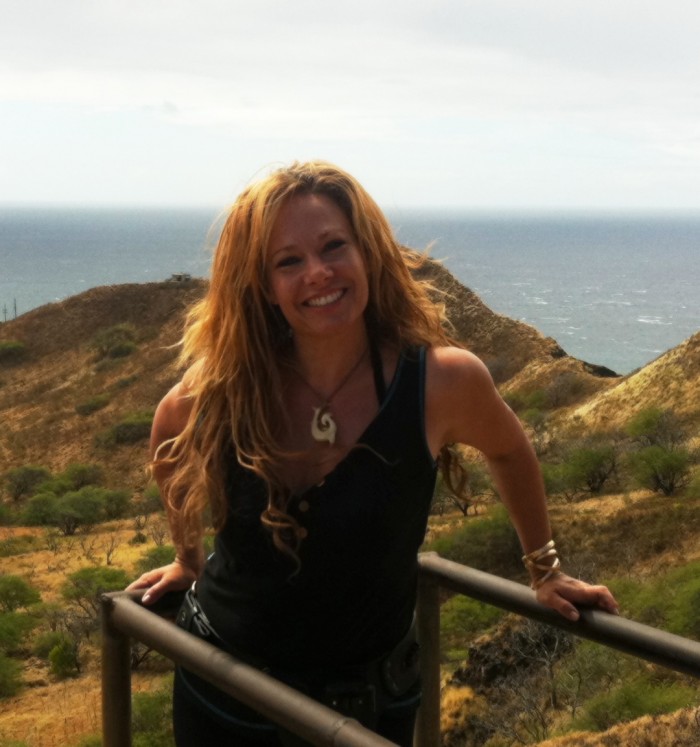 Malía Everette is a Food First board member and founder of the socially responsible travel company Altruvistas. Previously, she was the Director of Global Exchange Reality Tours. Malía has facilitated tours to over 80 countries focusing on international relations, human rights, political economy, sustainable development, women’s rights, and indigenous cultures. She holds a BA in English Literature and MA in International Relations. She has written numerous articles about socially responsible travel and is a regular public speaker and lecturer. Originally from Hawai’i, Malía brings a wealth of local knowledge and experience to this delegation.
Malía Everette is a Food First board member and founder of the socially responsible travel company Altruvistas. Previously, she was the Director of Global Exchange Reality Tours. Malía has facilitated tours to over 80 countries focusing on international relations, human rights, political economy, sustainable development, women’s rights, and indigenous cultures. She holds a BA in English Literature and MA in International Relations. She has written numerous articles about socially responsible travel and is a regular public speaker and lecturer. Originally from Hawai’i, Malía brings a wealth of local knowledge and experience to this delegation.
Katie Brimm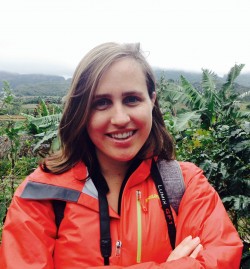 is a writer, activist, and the Program Director of Food First’s educational travel program Food Sovereignty Tours. She has traveled with the program to Bolivia, Cuba, the Basque Country and hosted Food Justice Tours in the San Francisco Bay Area. Katie has been with Food First since 2011, generating research and analysis on a number of issues including labor rights, social and environmental justice, and seed sovereignty. She holds a BA in Global and International Studies from UC Santa Barbara and is passionate about supporting the growing food sovereignty movement through global education and solidarity travel. She is excited to bring her experience and enthusiasm to this inaugural Food Sovereignty Tour to Hawai’i.
is a writer, activist, and the Program Director of Food First’s educational travel program Food Sovereignty Tours. She has traveled with the program to Bolivia, Cuba, the Basque Country and hosted Food Justice Tours in the San Francisco Bay Area. Katie has been with Food First since 2011, generating research and analysis on a number of issues including labor rights, social and environmental justice, and seed sovereignty. She holds a BA in Global and International Studies from UC Santa Barbara and is passionate about supporting the growing food sovereignty movement through global education and solidarity travel. She is excited to bring her experience and enthusiasm to this inaugural Food Sovereignty Tour to Hawai’i.

